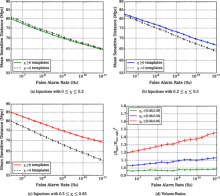
Abstract
We demonstrate for the first time a search pipeline with improved sensitivity to gravitational waves from coalescing binary black holes with spins aligned to the orbital angular momentum by the inclusion of spin effects in the search templates. We study the pipeline recovery of simulated gravitational wave signals from aligned-spin binary black holes added to real detector noise, comparing the pipeline performance with aligned-spin filter templates to the same pipeline with nonspinning filter templates. Our results exploit a three-parameter phenomenological waveform family that models the full inspiral-merger-ringdown coalescence and treats the effect of aligned spins with a single effective spin parameter χ. We construct template banks from these waveforms by a stochastic placement method and use these banks as filters in the recently developed gstlal search pipeline. We measure the observable volume of the analysis pipeline for binary black hole signals with Mtotal and χ∈[0,0.85]. We find an increase in observable volume of up to 45% for systems with 0.2≤χ≤0.85 with almost no loss of sensitivity to signals with 0≤χ≤0.2. We also show that the use of spinning templates in the search pipeline provides for more accurate recovery of the binary mass parameters as well as an estimate of the effective spin parameter. We demonstrate this analysis on 25.9 days of data obtained from the Hanford and Livingston detectors in LIGO’s fifth observation run.